Political processes and institutions. Рубрика в журнале - Arctic and North
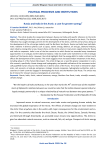
Russia and India in the Arctic: a case for greater synergy
Статья научная
The article studies the cooperation between Russia and India with specific reference to the Arctic region. The melting of the Arctic sea ice has seen tremendous investment by Russia in the Arctic. It has sought strategic partners for the development of the Arctic, with the primary focus being on the development of the oil and gas industry and the Northern Sea Route. Russia and India have had long-standing diplomatic relations. It has been in diverse spheres such as space, atomic energy, defense, oil and gas, diamond industry, steel industry being just a few ones. Russia’s focus on the Arctic ushers in many more opportunities for Russia and India to cooperate. India is one of the few countries to which Russia has accorded many investment opportunities in oil and gas and the diamond industry. India has made some investments in the oil and gas industry of the Russian Arctic. However, the article highlights that the energy deficit in India is dangerous, and it affects the development of the country. The article suggests more significant Indian investment in the Arctic, including phase II of the Yamal LNG project. It brings out a need for greater cooperation in scientific research, specifically climate change and hydrography, and possible utilization of the immense technically qualified human resource that India has in diverse areas of the Arctic. It is relevant for diplomats, civil servants, oil and gas companies, strategic mineral companies, hydrographic authorities, and researchers in both countries involved in developing the Arctic and the Northern Sea Route. The article may be of interest for relevant courses and programs at universities.
Бесплатно
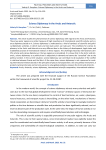
Science Diplomacy in the Arctic and Antarctic
Статья научная
The article studies the phenomenon of science diplomacy with regard to the Arctic and Antarctic. These two polar regions are similar because of high importance of international scientific activity and science diplomacy based on it. Science diplomacy is understood as a kind of synthesis of scientific and political-diplomatic activities, in which state and non-state actors can take part. The conditions for science diplomacy in the Arctic and Antarctic are very different due to the history of development, legal status and established practice of international relations in these regions. The challenges faced by international scientific activity and science diplomacy in the two regions are considered. It is shown that in the Arctic and Antarctic, science diplomacy as a political tool is objectively in demand and cannot be “cancelled” due to the political context. In the current situation, science diplomacy can contribute to de-escalation of the conflict in relations between Russia and the West. At the same time, science diplomacy is not a panacea for creating international relations based on the principles of peace and cooperation. Like any political instrument, it protects national interests and not only serves to solve global problems arising in the Arctic and Antarctic.
Бесплатно
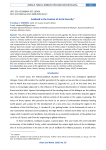
Svalbard in the context of Arctic security
Статья научная
The article studies Svalbard’s role in the Arctic security agenda, the history of the implementation of the Paris Treaty 1920 with the emphasis on its security provisions, as well as the risks of engaging Svalbard in a military conflict in the region. Despite the demilitarized status of Svalbard, the evaluation of its role in the hard security situation in the Arctic is hampered by several factors. First, Norway sticks to a narrow interpretation of the Treaty 1920 provision that bans any use of the archipelago for warlike purposes. Norway does not consider such actions as the entry of military ships in Svalbard’s ports, overfly of military aircraft, and some other, contradicting with the Russian position, a violation of the Treaty. Second, the development of technologies, particularly of “dual” use, has posed the question of whether the application of some objects situated on Svalbard by the militaries - primarily the stations of space monitoring - are legitimate. Third, as the political uncertainty in the Arctic rises, Svalbard has been more often involved in the worst-case scenarios for the region - as a place vitally important for Russia and simultaneously representing potential vulnerability for NATO. At the same time, the author argues that the threat of a military conflict over Svalbard is minimal. The international Svalbard agenda is dominated by economic issues, whereas the stakeholders stay aware of the significant risks in case of a military conflict on Svalbard.
Бесплатно
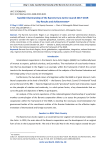
Swedish chairmanship of the Barents Euro-Arctic council 2017-2019: key results and achievements
Статья научная
The Barents Euro-Arctic Region is an integration of states and their administrative divisions, markedly different in terms of population living standards, but with a particular affinity that affords firm ground to consider the region as a separate geopolitical, economic, social and cultural macroregion. The article refers to the practical achievements of the national chairmanship of the Russian Federation in the Council of the Barents Euro-Arctic region; important aspects of the functioning of BEAR as a platform for strengthening of mutual trust and stability, respect for human rights, democratic values and gender equality, support for indigenous peoples, achievements in the fields of trade and economic cooperation, environmental protection, developments in the field of health care, tourism, industrial production, effective international transport links, urgent action to combat climate change and its impacts. The article concentrates on the analysis of key results and achievements of Swedish chairmanship of the Barents Euro-Arctic Council (October 19, 2017 - October 3, 2019), evaluating the current status and prospects for further international cooperation within the framework of the BEAR.
Бесплатно
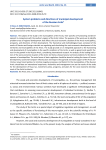
System problems and directions of municipal development of the Russian Arctic
Статья научная
The subject of the study is the municipalities of the Arctic, their specifics of functioning and development in comparison with the southern regions of the Arctic states. The purpose of the work was to identify problem areas of regional development that affects the socio-economic situation of the Arctic municipalities, prospects, and directions of their development. The theoretical and methodological basis consisted of the works of Russian and foreign scientists on regulating and stimulating the socio-economic development of the territories and municipalities of the Arctic. The study grounds on an integrated approach to the functioning and development of municipalities in the specific conditions of the Arctic, as well as general and specific factors for the growth in the Russian Arctic, considering international research. An analysis of the leading indicators of the socio-economic situation of the Arctic territories showed several common problems for the development of municipalities. The main forces of state regulation should be aimed at solving the issues of human development, social and transport infrastructure and require the approval and state support of the Arctic territories. Government policies to minimize negative processes and factors for the municipalities of the Russian Arctic should base on international experience. Authorities and management can use the results of the study for the development of fiscal, tax, investment policy, programs, and plans for the socio-economic development of the Arctic territories.
Бесплатно
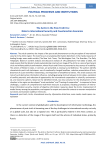
The Arctic in the Post-Truth Era: Risks to International Security and Counteraction Scenarios
Статья научная
The article examines the impact of the post-truth phenomenon on the perception of international security in the Arctic region. The main focus is on analyzing information distortions in the media resources of leading foreign mass media outlets (The New York Times, The Washington Post, The Guardian, The Daily Telegraph). Based on content analysis and discourse analysis of 176 publications from 2022 to 2025, the study reveals that the Western media systematically constructs an image of the Arctic as a zone of permanent crisis and military-political confrontation, where Russia and China are presented as key sources of instability. The actions of Western states, in contrast, are presented as necessary and defensive. The authors identify characteristic post-truth techniques: use of emotionally charged headlines, selective presentation of facts, distortion of cause-and-effect relationships, and imposition of simplified narratives. The article assesses the risks of such destructive information influence, including growing mistrust between Arctic states, escalation of conflict potential, and reduction of opportunities for international cooperation in scientific, environmental, and economic spheres. Based on the identified trends, two key scenarios for the development of the situation in the region are developed: “acute escalation” and “freezing of cooperation”. In response to these challenges, a system of comprehensive multi-level measures is proposed, including promotion of international information security, creation of objective information resources about the Arctic, improvement of media literacy among the population, and support for expert and scientific contacts to counter manipulative narratives and maintain stability in the Arctic.
Бесплатно
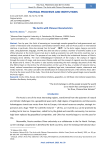
The Arctic with Chinese Characteristics
Статья научная
Year by year, the Arctic is becoming an increasingly complex geopolitical and geoeconomic epicenter of interaction and simultaneous confrontation between Arctic and non-Arctic actors in international relations. In particular, China has already “put its hands” (插手)to the Arctic region, being a non-Arctic state. Using diplomatic language, the PRC was able not only to conduct a number of scientific studies as an official observer at the Arctic Council, but also to build up economic ties with the Arctic countries over a relatively short period of time. The purpose of our study is to identify the institutional features of China’s emerging Arctic identity. The main methodological framework of the study is the analysis of regions through the prism of mega- and meso-areas (Osamu Ieda) and the concept of regional security complexes (B. Buzana and O. Vever). The author is also actively researching the main strategic document of the PRC (the White Paper on the Arctic), the UN Convention on the Law of the Sea, a number of relevant international, national conventions and agreements, regulatory legal acts, international reports, statements and media materials. The author considers the identification of institutional features of the Chinese Arctic identity to be the main result of the study. The article also forecasts China’s further geostrategic course towards the Arctic region.
Бесплатно
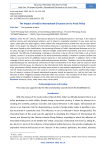
The Impact of India’s International Discourse on Its Arctic Policy
Статья научная
Since the 20th century, international discourse has gradually become a hot topic in the study of political science and international relations, and its impact is especially important in new areas such as space, cyberspace and polar regions, where stable rules and governance system have not yet been developed. In this paper, the influence of international discourse is classified as verbal, structural, institutional and moral. Based on this classification, the increasing influence of India's international discourse on its Arctic policy through its verbal expression, national strength, institutional involvement, and sense of values is examined. The difficulty of developing a strategy in the Arctic is due to the fact that India is not an Arctic country, so there is a cautious attitude of the world community towards it. Northern countries believe that India can use the Arctic for additional natural resources or even political benefit. In addition, there is little coverage of Arctic policy in the Indian media and government activities. Therefore, due to the possible misunderstanding by the international community of India's involvement in the Arctic and the country's weak awareness of Arctic issues, its influence on the international Arctic discourse should be improved in several ways: government officials should participate more actively in international organizations (UN, Arctic Council); the media should fully cover the country's activities in addressing Arctic issues; academically, integration of research, creation of special educational programs should be required, etc. Last but not least, the interests of Arctic Indigenous peoples should be taken into account. The resolution of all these issues can enable India to strengthen its position in the Arctic and increase the country’s potential.
Бесплатно
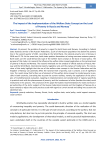
Статья научная
At present, the problem of poverty is urgent for both Russia and Norway. According to Federal State Statistics Service of the Russian Federation, 12.1% of the Russian population was below the poverty line in the second quarter of 2021. According to the World Bank, the national poverty rate in Norway in 2018 was 12.7%. At the same time, both states position themselves as having overcome extreme poverty. Both states use the social-democratic type of the welfare state concept as the basis of social policy. The purpose of this study is to research the influence the welfare state concept application on the national level of poverty in Russia and Norway. The research methods are the analysis of official statistics of Russia, Norway and the World Bank, international reports, legislative acts and the analysis of media texts. The conclusions of this study highlight that the use of the welfare state concept in the Russian Federation and the Kingdom of Norway can positively affect the national level of poverty, but it contains a set of significant risks. The results show that further use of elements of the welfare state concept to combat poverty is possible in both countries, but taking into account the current realities, namely, the application of the principles of multidimensional evaluation, targeting in implementation and consideration of regional specificity in practical work with the phenomenon of poverty, and the involvement of other (besides the state) social institutions in this process. The conclusion of this paper formulates recommendations for state and municipal authorities of the Arctic subjects of the Russian Federation (mainly) and the Kingdom of Norway (to a lesser extent) to adjust the social practices used with regard to current trends and taking into account the identified risks.
Бесплатно
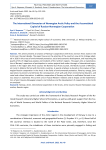
Статья научная
This article presents an analysis of Norway’s cooperation with Arctic and non-Arctic states in the Arctic over the past decade. The paper focuses on the priorities of the country’s new Arctic strategy adopted in 2020 in the areas of environmental protection, social and economic development, and improving the quality of life of indigenous peoples and residents of the northern regions. The paper aims at systematization of Norway’s experience of participation in various projects both under the aegis of international organizations in the region (the Arctic Council, the Barents-Euro-Arctic Council, the Nordic Council of Ministers, etc.) and in bilateral format with the Arctic countries. A special emphasis is placed on the analysis of Norwegian-Russian cooperation in the Arctic in the fields of environmental protection, fisheries, energy, joint operations to prevent and eliminate the consequences of oil spills and other environmental disasters, and social and cultural interaction. In addition, cooperation of Norway and Russia in multilateral formats in various sectors is examined. The current crisis in Russia-Western relations and its impact on the implementation of joint Russian-Norwegian projects and initiatives and the development of cooperation in the Arctic are analyzed.
Бесплатно
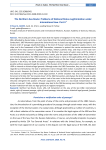
The Northern Sea Route: problems of national status legitimization under international law. Part II
Статья научная
The second part of the paper shows that the regime of navigation in the Arctic, particularly on the NSR, defended by Russia today, is much more liberal than that which existed in the Soviet years: up to the Gorbachev’s 1987 Murmansk speech the Soviet Arctic was a closed sea region for foreign navigation. Permissive order of passage established today at the level of Russian national legislation applies only to civil ships, and in the framework of the 1982 Convention, measures to protect the marine environment from pollution from ships cannot be applied to warships, military auxiliary ships, and ships on the state non-commercial service. However, the presence on the Northern Sea routes of water areas with the status of internal historical waters, including several Arctic straits, plus the special legal status of the Arctic, which is not limited exclusively to the 1982 Convention, allows Russia to insist on the applicability of the permit regime also to foreign warships. This approach is based mainly on the two states’ practice with the longest coastline in the Arctic: the USSR and Canada. Navigation along the NSR in today’s ice conditions is not yet possible without passing through the waters of the Russian Arctic Straits, whose waters are classified by the USSR as internal on historical legal grounds. Although under the 1982 Convention, they can be conditionally regarded as international, the lack of permanent transit through them makes it possible not to recognize them as such. However, the Russian Federation’s task to turn the NSR into an international shipping route may lead to a weakening of the current legal position. A similar situation may arise concerning the enforcement of Article 234 “Ice Covered Areas” of the 1982 Convention, which gives the Arctic countries additional rights in the field of navigation control. Lack of ice cover in the Arctic during most of the year can significantly strengthen the position of Russia’s opponents, who insist on a too broad interpretation of this article on our part. Finally, climatic changes may lead to the NSR becoming more latitudinal, and then the Russian Federation will lose any legal grounds to regulate navigation.
Бесплатно
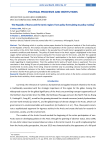
The Republic of Korea and the Arctic region: from policy formulating to policy making
Статья научная
The following article is a policy review paper devoted to the general analysis of the Arctic policy of the Republic of Korea. The analysis includes the explanation of the country’s demand for conducting its own policy in the Arctic that mostly resides in the peculiarities of South Korea’s geographical position and economic conditions and demands. The policy of South Korea in the Arctic region is highlighted in the three stages: before joining the Arctic Council, during the first master plan for the Arctic, and after the updated Arctic policy was issued. The brief history of the Korea’s participation in the Arctic activities is highlighted. Also, the provisions of Korea’s first master plan for the Arctic are highlighted, and some conclusions are made regarding its implementation. Then the updated Arctic policy of South Korea is examined. The core conclusion is that during 20 year of participation in the Arctic-related activities, the Republic of Korea has transformed its Arctic policy from being research-oriented only to providing national economic benefits from the multilateral inclusion in the Arctic cooperation institutions and events. Some further reflections on Korea’s further Arctic policy are provided at the conclusion.
Бесплатно
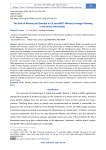
The Role of Norway and Sweden in US and NATO Military-Strategic Planning in the Arctic (mid-2020s)
Статья научная
Against the backdrop of Stockholm’s official accession to NATO (March 2024), the significance of Sweden and Norway’s power for the plans of the community of “Western democracies” is examined. Methodologically, the theory of armed forces construction (for the Scandinavian states, NATO as an institution) and the concepts of securitization are used. The paper determines why the Alliance’s forward deployment force network does not de jure extend to Norway, even though Norway consistently contributes to the formation of the bloc’s permanent groups. The article explores a set of measures aimed at building up forces in the provinces of Troms and Finnmark as a “springboard” for Western strategic penetration to the Arctic. The evolution of the US presence in northern Norway is shown, with a focus on the 2021 and 2024 agreements on access to the Kingdom’s bases. The content and consequences of decisions to significantly increase Norway’s ground forces are examined. The goals and characteristics of Sweden’s future presence in Finnish Lapland are revealed. It is proven that the United States is the key beneficiary of the measures under consideration. Relying on the increased military resources of its Scandinavian partners, the White House has been strengthening the basis for the penetration to the Arctic Ocean (from Europe), increasing the effectiveness of “containment” of the Russian Federation. The conclusion is drawn that the West has a dangerous desire to catch up with and surpass the Russian Federation in terms of the number of Arctic troops.
Бесплатно
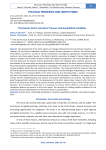
The Russian Arctic, Sanctions Pressure and Geopolitical Instability
Статья научная
The development of the Arctic region was strongly influenced by the international situation — on February 24, the Russian Federation launched a special military operation in Ukraine. The United States, Great Britain and the EU, as well as several international and regional organizations imposed extended sanctions restrictions against Russia in the fields of politics, economics (transport, finance, trade, defense industry, aviation) and scientific research, which had regional consequences. The article describes the factors that determine the Russian Arctic's development under the collective West sanctions pressure. The interrelation of the state policy and social and economic development of the Arctic regions of Russia during the period of general geopolitical instability is investigated. The study uses the dialectical method, as well as general logical, theoretical and empirical research methods. The study examined the measures taken by the Russian government to ensure sovereignty and economic and technological independence in the Arctic. The conditions for increasing stability in the Arctic zone are also decompounded, a number of proposals that are of the brightest and most pronounced interest for the formation of stability in the region are presented, and the established goals and motives of economic development are outlined. The authors analyzed the geopolitical conditions for the development of the Arctic region today, trying to reflect the intentions of the main Arctic players in the current situation and determine the vectors of their further political decisions. The conclusion is made that it is necessary to increase further efforts on the Arctic track, to strengthen defense and security in the Arctic region. The necessity of creating suitable conditions for the integrated economic development of the Russian Arctic is substantiated.
Бесплатно
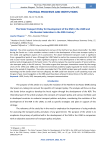
Статья научная
The article examines the development and use of the Northern Sea Route (hereinafter: the NSR) during the Soviet era. It also considers various trends in the development of the state transport policy in the world and significant aspects of its assessment. The above-mentioned transport route is significant from a geopolitical point of view. Although the USSR failed to realize the commercial potential of the NSR and its year-round operation, it made significant progress in the development of the NSR to achieve the political and strategic goals of the Soviet Union. The article analyzes the essential aspects of Soviet and Russian transport policy in the XX century. The author argues that transport innovations caused by the energy crises of the 1970s and 1980s and related environmental problems largely bypassed the Soviet economy due to the period of stagnation. The author concludes that if the USSR had kept pace with modern trends in technology and the Soviet Union had not collapsed, the NSR could have become a self-sustaining route and the goal of year-round navigation on the NSR would have been achieved in Soviet times in the 20th century.
Бесплатно
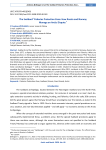
The Svalbard fisheries protection zone: how Russia and Norway manage an Arctic dispute
Статья научная
Svalbard and the maritime zone around this Arctic archipelago are central to Norway-Russia relations. Since 1977, a dispute has concerned Norway's right to exercise jurisdiction over fisheries. What are Russian positions on Norwegian jurisdiction enforcement in the Fisheries Protection Zone (FPZ)? How have perceptions and reactions evolved since the turn of the millennium? Has the deterioration in the bilateral relationship post-2014 sharpened the dispute in the FPZ, and has the risk of conflict increased? We find that 2014 does not appear to be a watershed with respect to relations in the FPZ around Svalbard. After the dramatic arrest of a Russian trawler in 2005, the Russian central authorities switched from protest to relatively conciliatory dialogue - with a marked exception in 2011 related to Russian domestic discord surrounding the 2010 Barents Sea maritime boundary agreement. After 2011, incidents in the FPZ have been handled without further escalation, but the situation is underpinned by various factors that might change. Russia’s policies in the FPZ have been a balancing act: always stressing its official position and insisting that there are limitations to how much Norwegian enforcement can be accepted, while also ensuring that the enforcement regime survives.
Бесплатно
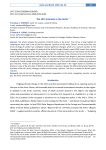
The UK’s interests in the Arctic
Статья научная
The article analyzes the priorities of British policy in the Arctic. The UK has a long tradition of studying the Arctic and is one of the first observer countries of the Arctic Council. At the same time, the Arctic strategy of London has undergone several significant changes, which are a natural reaction to the changing situation in the region. An analysis of the British Foreign Ministry report 2018 reveals four primary areas of the UK's interest in the Arctic. First, the country's economy continues to rely heavily on the hydrocarbon and bioresources of the Arctic. Secondly, after the outbreak of the Ukrainian crisis and in the conditions of deteriorating relations with Moscow, the British authorities have begun to pay more attention to the security, primarily the military one. Third, an important direction of the UK Arctic policy is to solve the problem of climate change since the country considered one of the world leaders in reducing greenhouse gas emissions. Finally, the development of international cooperation in the region based on scientific diplomacy is one of the priorities of British Arctic politics. However, despite the official documents fixing the priorities of the UK’s Arctic strategy, London’s Arctic policy is passive. This fact is a reason for British expert criticism.
Бесплатно

The northern sea route: problems of national status legitimization under international law. Part I
Статья научная
The Northern Sea Route (NSR) for the Russian Federation is a strategically important maritime communication with the status of a historically established national transport artery. Despite its applicability to the Arctic, and therefore to the waters of the NSR, the norms and provisions of the modern international maritime law, and, first of all, the UN Convention on the Law of the Sea 1982 (UNCLOS), Russia declares the important role of the national legislation on the regulation of navigation on the NSR. Such a situation is conditioned by the existing historical practice, the tacit consent of most states, as well as the special environmental vulnerability of the Arctic region and the desire to prevent the marine environment pollution due to the navigation. Among the main opponents of this approach is the USA, which traditionally disputes the unified permitting regime for navigation along the NSR as an example of Russia's extremely broad interpretation of the norms and provisions of UNCLOS. The first part of the paper will show how those legal approaches used by Russia to introduce the national level of the NSR regulation, i.e., the concept of internal historical waters and the method of straight baselines, do not contradict UNCLOS, as they go beyond its limits and are based mostly on customary norms of international law (the so-called international custom) rather than treaties. The U.S. disagreement with such an assertion is discredited by the fact that Washington is not a full party to UNCLOS, and thus cannot fully enjoy all the prerogatives it has introduced.
Бесплатно
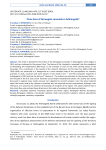
Three lives of Norwegian consulate in Arkhangelsk
Статья научная
The article is devoted to the history of the Norwegian Consulate in Arkhangelsk, which began in 1815 and has continued to the present time. The history of the Consulate is analyzed from the standpoint of identifying the fundamental differences in the activities in each of the three periods (lives) of the Consulate. This, in particular, is the novelty of the research. Moreover, the first two lives (1815–1920 and 1924–1939) are presented as a background to a more detailed study of the prerequisites for creation, priorities in work, successes and some failures of the modern one — the third Consulate reopened in Arkhangelsk in 2010 and has the status of “Honorary”. The authors pay attention to the personal factor — the life path of the first and current honorary consul Andrei Alexandrovich Shalev. His activity was mainly discussed in regional mass media and was not subjected to research analysis. Even the actual material about the events held by the Honorary Consulate was not collected and not systematized, although it has relevance, as it concerns the interests of thousands of residents of the region. The authors believe that in this article they only outlined those directions in the study of consulates that deserve attention.
Бесплатно
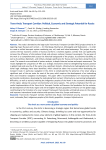
Trans-Arctic Transport Corridor: Political, Economic and Strategic Potential for Russia
Статья научная
The study is devoted to the large-scale Trans-Arctic Transport Corridor (TATC) project aimed at integrating major Russian port centers — St. Petersburg, Murmansk, Arkhangelsk and Vladivostok — in order to create a unified transport system combining sea, rail, road and inland waterways. This project aims to connect the key economic centers of Eurasia and form a seamless logistics corridor that can significantly increase the efficiency of international trade and enhance national transport sovereignty. The purpose of the work is to comprehensively assess the historical background of the project, its economic feasibility, as well as its political, diplomatic, and military-strategic significance for Russia and its partners along the Arctic route. The research uses methods of system analysis, in-depth historical review and expert assessment. The results highlight the uniqueness of TATC as a strategic instrument aimed at strengthening Russia’s position in global trade and security. At the same time, significant climatic, infrastructural, hydrographic and international legal challenges have been identified, which should be taken into account when developing the transport route. In particular, navigation in the Arctic is complicated by the presence of ice cover along a significant part of the sea route for most of the year, which requires the development of an icebreaking fleet and innovative navigation technologies. The paper offers recommendations for improving interdepartmental coordination, developing the icebreaking fleet and port infrastructure, overcoming hydrographic difficulties, as well as actively involving the indigenous peoples of the North in the economic development of the region, taking into account environmental and social aspects. The authors emphasize that the successful implementation of the Trans-Arctic Transport Corridor will become the foundation for the sustainable development of the Arctic region and will strengthen Russia’s geopolitical influence on the global stage, contributing to the formation of a new transport framework that provides unhindered access to the oceans and improves international trade relations with partners from Asia, Europe and America.
Бесплатно

